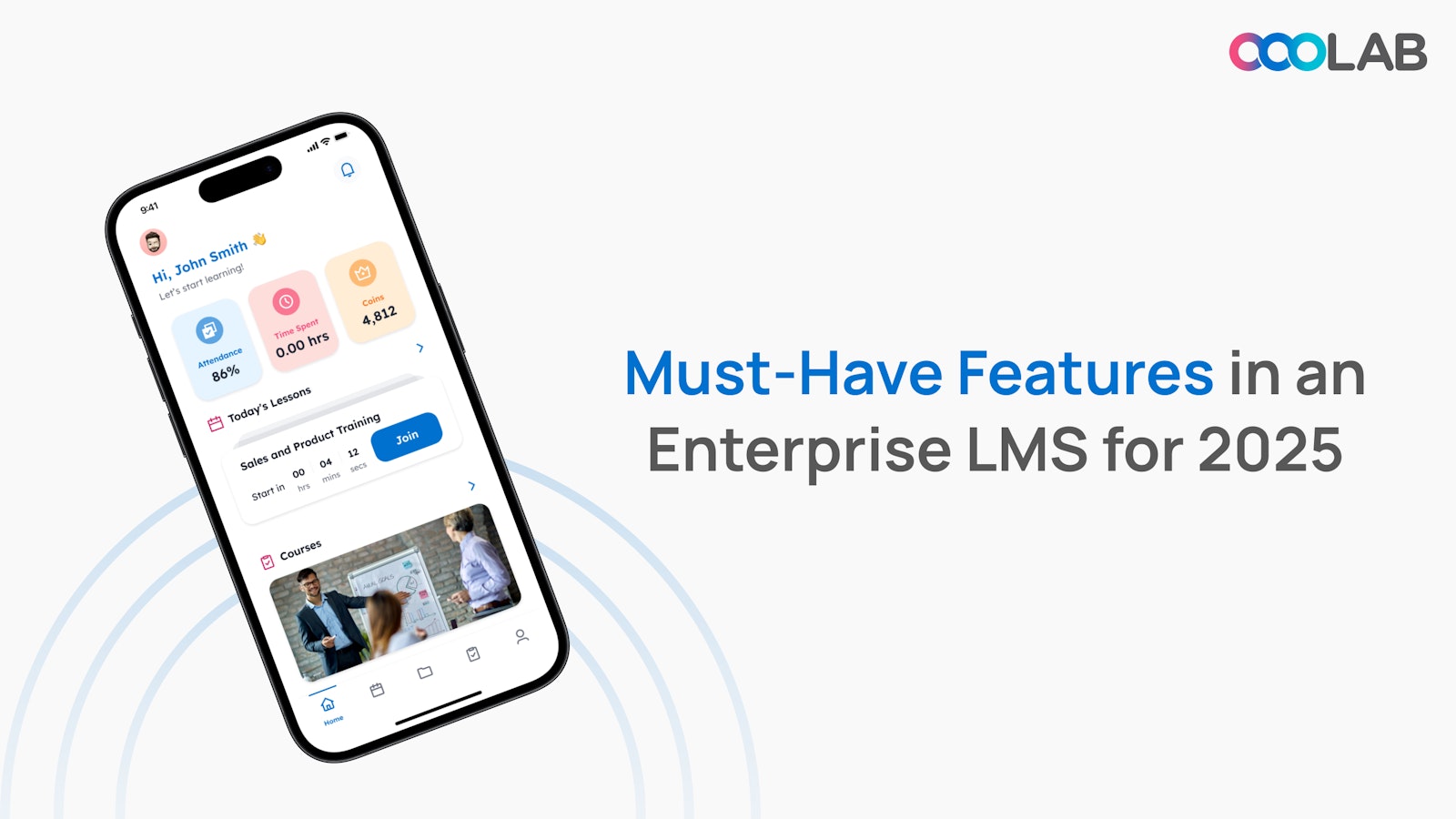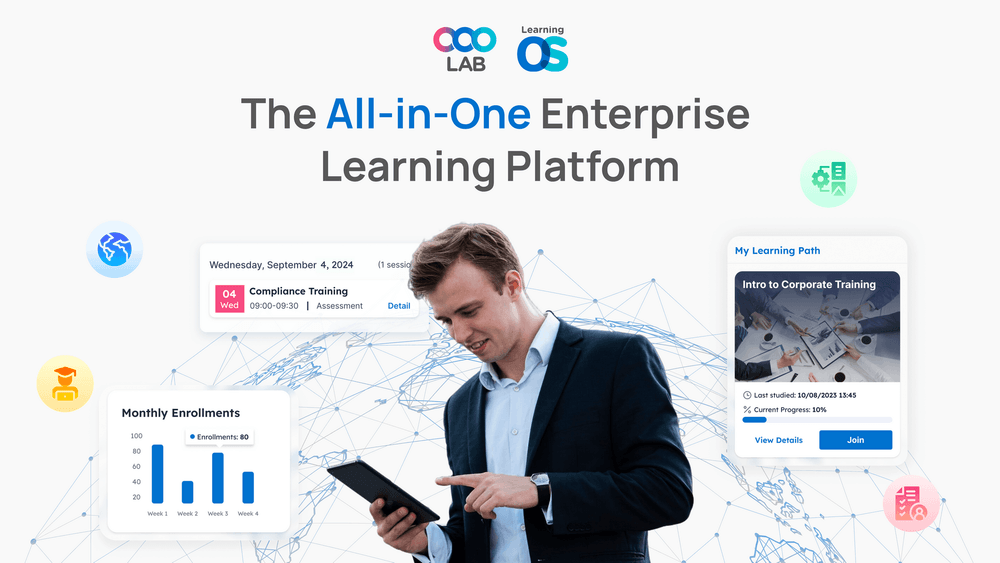

In 2025, the need for robust Learning Management Systems (LMS) is more critical than ever as businesses strive for scalable, efficient, and engaging employee development. Whether you’re a large enterprise or a growing organization, selecting the right LMS can significantly impact the success of your learning and development initiatives. This blog outlines the essential features that make an LMS "enterprise-ready" and highlights the must-have features in 2025 that businesses should look for to stay competitive.

An LMS designed for enterprises must be more than just a basic training platform; it needs to be scalable, secure, and capable of supporting complex organizational needs. For an LMS to be considered "enterprise-ready," it must meet the following criteria:
- Scalability: The LMS should be able to grow with the business, supporting increasing numbers of users and content as the organization expands.
- Integration Capabilities: It must seamlessly integrate with existing enterprise software like HR systems, CRMs, and other tools.
- Customization: The platform should offer customization options to tailor the learning experience to the specific needs of the business.
- Security: Given the sensitive nature of company data, robust security features are essential to protect user information.
- User-Friendly Interface: An intuitive interface that reduces the learning curve and encourages user adoption is key for large organizations.
>>> Read more: What is an Enterprise LMS
>>> Read more: Customization Options for Enterprise LMS
>>> Read more: Common challenges when implementing an Enterprise LMS
>>> Read more: Steps to implement an Enterprise LMS
>>> Read more: Enterprise LMS - revolutionizing corporate training and development
As the business landscape continues to evolve, the features required for an effective LMS have grown. Let’s examine the must-have features for an Enterprise LMS in 2025.
A cloud-based LMS is crucial for businesses seeking to scale their learning processes. Cloud integration ensures that the system can grow as the organization grows, with access from any device and location. It also eliminates the need for complex and costly on-premise infrastructure, making learning more flexible and efficient.
Cloud-based LMS solutions are not only cost-effective but also enable a better user experience and scalability, supporting the needs of large enterprises effectively. In fact, a report from Gartner indicates that cloud solutions can reduce IT management costs by up to 53%.
Personalized learning paths are essential for improving engagement and retention. A good LMS should offer the ability to tailor the learning journey for each employee based on their role, skill level, and career progression. This increases motivation and ensures that employees are receiving relevant training for their professional growth.
Gamification is a powerful tool to drive learner engagement. Features such as leaderboards, badges, and interactive quizzes can significantly enhance motivation, making learning more enjoyable. By integrating game-like elements, an LMS can create a more dynamic and immersive learning experience.
An effective LMS must include robust reporting and analytics tools that enable organizations to track learner progress, measure course effectiveness, and identify knowledge gaps. This data is crucial for managers to optimize training programs and improve learning outcomes across the organization.
According to Mordor Intelligence, companies that use data-driven learning programs experience 17% higher engagement rates from employees.
In 2025, mobile learning is no longer a luxury; it’s a necessity. A mobile-optimized LMS ensures that employees can access training materials anytime, anywhere, using their smartphones or tablets. Additionally, ensuring accessibility for individuals with disabilities is essential for an inclusive learning environment.
As reported by Statista, the mobile learning market is projected to reach $38.6 billion by 2025, reflecting the growing importance of mobile learning in today’s business world.
Artificial intelligence (AI) is revolutionizing the way learning is delivered. AI-powered LMS platforms can automate routine tasks such as content recommendations, progress tracking, and learner assessments. This saves time and resources while providing a more personalized learning experience for users.
Compliance training is a critical aspect for industries like healthcare, finance, and manufacturing. An Enterprise LMS should be capable of delivering, tracking, and reporting on mandatory training to ensure organizations remain compliant with regulations. This feature is essential for mitigating risks and avoiding legal issues.
According to a study by Skillsoft, 85% of companies prioritize compliance training due to the ever-increasing regulatory landscape in various industries.
Seamless integration with other enterprise tools, such as HR software, ERP systems, and CRM platforms, is essential for streamlining training processes. Integration ensures that the LMS functions as part of a unified ecosystem, allowing for efficient data sharing and streamlined workflows across departments.
An enterprise LMS should come equipped with advanced content authoring tools that make it easy for organizations to create and customize training materials. These tools should support various media formats—such as videos, interactive quizzes, and simulations—to cater to different learning styles.
According to ELearning Industry, interactive content increases engagement and retention rates by 75%, demonstrating the importance of dynamic content creation.
As businesses expand globally, offering multilingual support within an LMS is vital. An LMS that supports multiple languages ensures that employees from different regions can access training in their native language, promoting inclusivity and improving the learning experience.
Book Free Demo with us. Bring your Training and Learning to a new height with LearningOS.

For organizations looking to enhance employee development and improve overall productivity, an Enterprise LMS is an indispensable tool. The features discussed above are not just trends—they are essential for businesses aiming to remain competitive and develop a highly skilled workforce in 2025. Investing in an LMS that supports scalability, personalization, and integration will ensure that your training initiatives are both effective and impactful.
To learn more about how an Enterprise LMS can transform your organization’s learning programs, explore how it can be integrated into your Sales Training programs to drive employee performance here.
At OOOLAB (pronounced 'uːlæb'), our mission is to make complex learning operations simple. We aim to positively impact the lives of over 1,000,000 learners and educators by the end of 2026.
OOOLAB's LearningOS provides educational institutions and corporate enterprises with an all-in-one solution to create and deliver engaging learning experiences.
We meet organizations' needs or support your growth. We provide undivided attention. We provide:
1. Dedicated success manager: We offer direct communication with a real human who'll discuss your enterprises unique learning operations and goals.
2. Personalized setup: Our team will help you transition to LearningOS on your schedule, one step at a time.
3. Around the clock support: Get help from us any time, and in any time zone.
We have recently launched a new AI training tool, Skill Quotient OS, designed to elevate hybrid training to new heights. It offers role-play exercises with scenarios and assessments.This tool can apply in sales training, corporate development and customer support training in any industry.
Reach out to us at: LinkedIn, Facebook, Instagram, Tiktok, X
1. What are the main benefits of LearningOS
Our platform is easy to use and automates all aspects of your learning operations. It efficiently manages complex tasks, allowing you to concentrate on delivering exceptional learning experiences.
2. What main features does LearningOS offer?
Our all-in-one software solution combines a Content Management System, a Learning Management System, content authoring tools, and a mobile friendly Learner Portal.
3. Can your platform be used for corporate enterprises?
Absolutely! LearningOS is an Enterprise LMS is a great fit for corporate learning. In fact, we have clients with up to 700,000 employees using LearningOS! Upskill your workforce by creating and assigning interactive eLearning content while effortlessly tracking employee progress.
4. Who currently uses your platform?
Our platform is currently used by over 120,000+ learners, parents, and employees across 21 countries worldwide!
5. What types of content options are available on your platform?
We offer ready-to-go curriculums for various educational purposes or our expert design team can build a custom course for you. We can also upload your existing learning materials and enhance them digitally.
6. What is unique about LearningOS?
Our platform, designed by educators for educators, provides you with all the tools you need to scale. Build and promote your own hybrid and blended learning courses and save money on licensing fees by owning your own proprietary content.
7. How can I get started?
Schedule a meeting with our experts and we’ll talk about how our platform can address your unique challenges and help to grow your business.